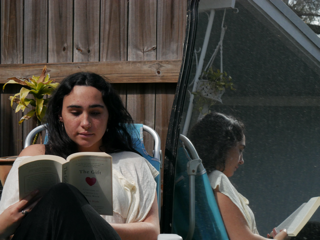By Audrey Cress
Two years ago, Emma Torres, Flagler College senior, started to feel like social media was stealing something from her life experiences. In a social psych class, she and her classmates discussed the illusions of social media and its true impact on their day-to-day life.
“There are authentic people on there, but it’s curated in a certain way and makes you curate your life in a certain way,” she explained. “I was like ‘I am spending so much time on something that isn’t real life and missing out on real life because of it.’”
Torres saw a friend live without social media, embracing a free, empowering lifestyle, inspiring her to do what we have all considered at some point: She deleted every outlet of social media she had.
With the average college student estimated to spend an average of 4.5 hours a day on social media (according to Gallup survey), her decision just sliced out the same amount of time someone would work at a part-time job. Torres is not alone in her choice to acknowledge the impacts of social media on their time and mindset, consequentially cutting the chord.
A recent study has shown that reducing the number of social media hours can benefit mental health, and it’s common to find college students posting about their decision to getting rid of social media altogether.
This study described stepping away from posting on social media as an eye-opening event, exposing the fixation they had with the online persona they had created, whether it was inspired by real life or not.
“At first it was a challenge,” said Emma. “I would grab my phone to check Instagram or snapchat and so I had to find other ways to entertain myself.”
The urge to delete socials started years before she acted, but she acknowledges the addicting side of social media. Starting with TikTok, she realized the itch to scroll mindlessly would move itself to Instagram reels. She deleted Instagram, but then found herself on Facebook.
“It was kind of scary. Cause I’m like trying and I could not help myself… The only way is to really delete it,” she said.
After not only deleting the apps but her accounts on TikTok, Instagram, Snapchat, Facebook, and Pinterest, she discovered a true freedom for the urge to scroll.
Social media left a big gap in her time, but necessity is the mother of invention, and she started to discover new hobbies and interests like rock climbing, baking, playing the guitar, or just taking time to practice the art of sitting still. This constant push to find something to do has exercised her ability to try new things, and her boredom has revealed a whole new facet of being human. One that gives her the space to create, live, and feel.
“We wonder why we’re not creative or don’t try new things, or we look at other people and ask how they do all these cool things, but you’re not giving yourself the space to do those things. All your space and time is filled. That’s not how humans are meant to exist and live,” said Torres.
Along with a new list of skills, she noticed changes in the way she views herself and the people around her.
“I noticed I care less about what other people think, but also what the drama is… I don’t find myself comparing my life to other people,” said Emma. “I kind of just live how I want, and it feels good. And I seek connections now in person more than online.”
Bella Hannon, Assistant Director of Student Engagement, explained that because college students are so present on social media, it is used a resource for students interested in Flagler College or looking for ways to become involved on campus. “We want to meet them where they are and that means posting and sharing our events on social media. It helps us bring students together,” said Hannon.
As social media is used as a tool for connection, Emma shared how she has lost many relationships with high-school classmates and acquaintances that were only kept alive by social media. However, she argues that those are not real friendships if social media was the only thing keeping them alive.
After two years without socials, winding down at the end of a long day, relaxation and peace have become much more attainable.
“Now I find myself reading or stretching before bed or just like sitting there and staring at the ceiling. I fall asleep a lot quicker because I don’t go to bed anxious. I just think about sleep while I fall into it,” she said.
Similarly, social media isn’t the first thing she looks at in the morning. Instead, she takes a step outside, socializes with her roommates, makes breakfast and coffee, journals, or reads.
While the occasional pop culture reference she hasn’t heard can leave her feeling isolated, it only lasts a moment and at the end of the day, it doesn’t matter to her anymore.
“Truly one of the best things I’ve done,” said Torres. “And I wish it didn’t exist so everyone would have to experience it.”




Be the first to comment on "College Student Shares Why She Deleted All Socials – and What Life Is Like Without It"